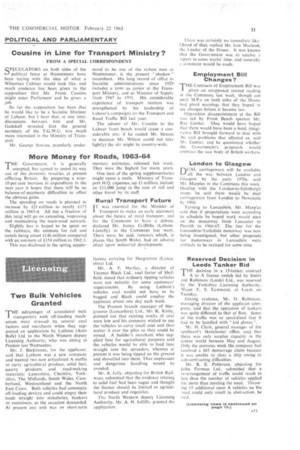Two Bulk Vehicles Granted,
Page 13

If you've noticed an error in this article please click here to report it so we can fix it.
THE advantages of articulated bulk transporters with off-loading mechanism were stressed by several coal
• factors and merchants when they supported an application by Lathom (Auto Bulk) Ltd. to the North Western deputy Licensing Authority, who was sitting at Preston last Wednesday. • Mr. J. Backhouse, for the applicant, said that Lathom was a new company and wanted two new articulated A outfits to carry agricultural produce, solid fuel, quarry products and road-making materials; Lancashire, Cheshire, Yorkshire, The Midlands, South Wales, Cumberland, Westmorland and the North Fast Coast. Both vehicles had automatic off-loading devices and could empty their loads straight into stokeholes, bunkers or containers, as the occasion demanded. At present one unit was on short-term licence carrying for Hargreaves (Lancashire) Ltd.
Mr. A. F. Hartley, a director of Thomas Black Ltd., coal factor of Sheffield, stated that ordinary tipping vehicles were not suitable for some customers' requirements. By using Lathom's vehicles coal would not have to be bagged and Black could employ the applicant about one day each week.
The Preston branch manager of Hargreaves (Lancashire) Ltd., Mr. K. Kirby, pointed. out that existing stocks Of coal were low and his company wished to use the vehicles to carry small coal and then scatter it over the piles so they could be mixed. A builder's merchant who supplied lime for agricultural purposes said the vehicles would be able to feed lime straight into the spreaders, whereas at present it was being tipped on the ground and shovelled into them. Thus unpleasant and dangerous handling would be avoided.
Mr. A. Jolly, objecting for British Railways, submitted that the evidence relating to solid fuel had been vague and thought the licence should be limited to agricultural produce and requisites.
The North Western deputy Licensing Authority, Mr. A. H. Jolliffe, granted the application.
.1 here was certainly no immediate likelihood of that replied Mr. lain Macleod, the Leader cif the House. It was known that the Government was to receive a report in some; weeks' time, and naturally a statement would be made.












































































































